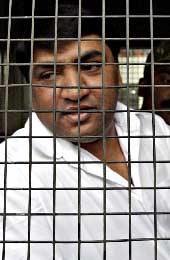 |
| PUT TO THE TEST: Telgi was subjected to two more procedures besides narcoanalysis |
A man lies supine. Obviously drugged up to the eyeballs. Questions fly thick and fast. The man mumbles. Someone slaps his cheeks to make him ‘talk’...
The scene will haunt viewers for years. Not a scene out of a crime thriller, but primetime news footage: India’s most talked-about scamster, Abdul Karim Telgi — drugged with the ‘truth serum’ — with a group of doctors poking and prodding the dark recesses of his mind to draw out the ‘truth’ on the multi-crore fake stamp paper scam rocking the nation right now.
A historic moment, no less. With no previous legal precedent in the use of such drugs, lawyers have locked horns over whether the ‘truth serum’ test (narcoanalysis) is legally tenable or not. Legal opinion seems to be split in two camps. There are no half-truths here. Either you are for it or against it. The wrangle that started ever since a special court in Pune allowed an array of scientific tests on the main accused (December 16), reached murky depths last fortnight with Telgi blurting out new names after the tests — and his lawyer contesting the results. The ball now rests with the Mumbai High Court. With its hearings on how much truth serums can be relied upon which started from February 24, one expects (or fears) a whole lot of changes in the Constitution and criminal justice system in the near future.
Telgi was subjected to three tests — the polygraph or lie detector test, the P-300 or brain mapping and narcoanalysis (on February 10). But unlike the first two, narcoanalysis is an invasive procedure, with subjects being lulled into conversational mode by being injected with an anaesthetic.
The primary objection came from several of the accused who refused the test on the grounds that it could damage their brain. “However serious the crime, no investigating agency could be allowed to play with the lives of the accused,” points out defence lawyer, Dipesh Mehta.
But ask Dr S. Malini, the Bangalore-based forensic expert who was in charge of the narcoanalysis test on Telgi. She refuses to accept the charge: “It’s a harmless drug, similar to the ones used during surgery. Its effect wears out in 30 minutes and the residue gets washed off after 48 hours.”
To the defence lawyers, however, subjecting an accused to such tests violate Article 20 (3) of the Constitution, which lays down that “an accused can not be forced to become a witness against himself”. But prosecutor Raja Thakre counters that: “We are not using it as evidence, but as a means for collecting evidence.” Thakre holds that modern science as a tool of investigation has immense potential for the greater good of society. “Think of the privileges the accused enjoys anyway,” he retorts. “He can make any statement under police custody that cannot be used as evidence against him. He cannot be subjected to third degree. He cannot be compelled to give any kind of information.”
In some circles, the ‘truth serum’ test is seen as an alternative to third-degree treatment, especially in the case of white-collar crimes. But Thakre denies this. “That’s not possible,” he asserts, “because, unlike the third degree, narcoanalysis is video-graphed. It can be clearly seen whether the accused was compelled to give the information or did so by free volition.” Malini, in fact, argues that it is the most humane approach to extracting the truth.“Unlike in third degree,” she says, “where even an innocent person may confess to the crime for fear of being beaten up, narcoanalysis is fool-proof. It’s the most humane approach to upholding the criminal justice system.”
Lawyers are also divided on whether the results of narcoanalysis should be admissible as evidence in courts. Confessions made by a semi-conscious person are not admissible in court, said advocate P.R. Vakil (who represents one of the accused) in a recent press interview in Mumbai. Others, however, are quick to point out that the results of such tests can be used to “get admissible evidence, can be collaborated with other evidence or support other evidence”. According to criminal lawyer Majeed Memon (who filed a public interest litigation in the Telgi case on behalf of social activist Anna Hazare), since the court gave permission to conduct these tests, only it can decide the admissibility of the test result and other related evidence.
Moreover, public prosecutors, investigators and forensic experts are pointing out that narcoanalysis is never carried out without a court grant and the signed consent of the subject. “We explain to the subjects what they will undergo,” clarifies Malini, “what they are likely to disclose and leave the decision to them. Only forensic and medical experts are allowed during the probe.”
The main issue, however, is the legal ‘truth’ and the search for it. To many, narcoanalysis is the only way out. “It’s very difficult to escape the truth under the drug,” holds Malini. “If the person is innocent, he has nothing to fear.” But nothing is ever that simple. In many countries in the West, this investigative technique, however humanitarian, is raising serious questions of individual rights and liberties. In the US, where drugs have gained some acceptance in police work, their use has provoked cries of “psychological third degree” and has precipitated medico-legal controversies. There is a spiralling debate on the legality of the use of ‘truth serums’ in the wake of 9/11, with constitutional experts proposing the introduction of ‘truth serum warrant’ as a way forward for the forensic tool.
Back in India, the debate is still fuzzy. But arguments for and against using narco-interrogation in police work are hotting up. The outcome may very well lead up to a new road to justice.










